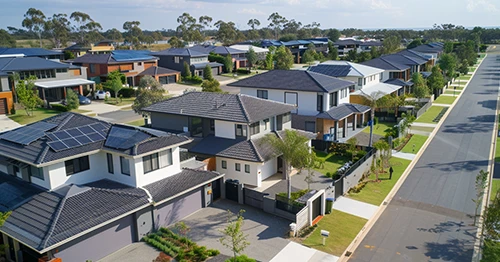Updated: 25 Feb, 2025
Interest rates are on the rise. HLE can help you soften the blow. Click here to find out more.
The Reserve Bank of Australia (RBA), the country’s central bank, manages monetary policy and currency. The cash rate is the interest rate on overnight loans between banks; it acts as a benchmark for all banks when they set their interest rates for lending. Setting the cash rate is one of RBA’s most important responsibilities. It can announce adjustments to the rate at any of its meetings on the first Tuesday of each month. When the cash rate changes, it usually has an impact on variable mortgage rates.
Why Does The RBA Change The Cash Rate?
The RBA changes cash rates to keep inflation in check. When the RBA lowers the cash rate, money is cheaper for banks to borrow, which encourages them to lower their interest rates. On the flipside, the RBA employs a cash rate increase when it fears inflation will rise too much; banks then have to pay more to borrow money, so they pass on that expense to you by raising your interest rates if you have a variable rate mortgage.
For cash rate changes to have an impact on the economy, banks need to follow suit. A change in the cash rate has an impact on the economy only when banks change their interest rates in line with the movements of the cash rate.
Did you find this helpful ? Get more info like this in your inbox every week.
Subscribe todayCash Rate Vs Interest Rate: How Does Each Affect Your Mortgage?
Your mortgage interest rate directly affects your mortgage repayment amount. The RBA cash rate, however, affects your mortgage repayment only through your mortgage interest rate.
How? If the cash rate goes up, it is likely that your mortgage interest rate will also increase, as the bank will want to pass on the increased cost of borrowing money. Similarly, when the cash rate decreases, this puts pressure on the banks to lower the interest rates they offer. A bank would like to keep its interest rates high. But it will reduce its interest rates to stay competitive when other banks start to lower their rates.
If you have an existing variable-rate mortgage, an increase in the cash rate will lead you to pay higher interest on your mortgage. Whereas, if you are thinking of applying for a home loan, and you think the RBA might raise interest rates in the near future, you can try to get a fixed-rate loan secured before the increase, to lock in a lower rate.
Sometimes, cash rate changes don’t result in interest rate adjustments. This is because banks set their interest rates based on a number of different factors, including other market conditions like inflation. During such times, shopping around at different lenders to get the best deal is especially important.
To avoid making expensive repayments, always get advice from a mortgage broker who is up to date on current cash and interest rate trends in the property market.
If you would like to speak to one of our senior mortgage brokers, simply call us on 1300 889 743 or complete our online enquiry form today.





